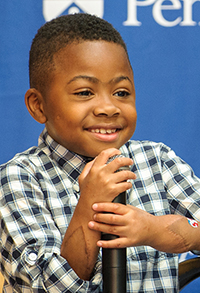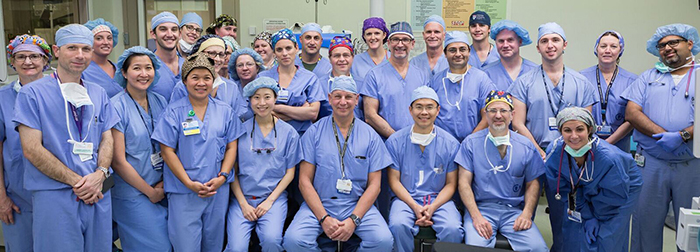Zion’s Story: One Year Later

Zion Harvey
Today, nine-year-old Zion Harvey can throw a baseball over home plate. He can write in his journal, prepare himself lunch and manage zippers on his clothes. For most of his life, however, these and many other ordinary actions were impossible for this little boy.
In the summer of 2015, surgeons at The Children’s Hospital of Philadelphia (CHOP) and Penn Medicine joined with colleagues from Shriners Hospitals for Children—Philadelphia, to complete the world’s first bilateral hand transplant on a child. The surgical team successfully transplanted donor hands and forearms onto then-eight-year-old Zion who, several years earlier, had undergone amputation of his hands and feet and a kidney transplant following a serious infection (Almanac December 15, 2015).
In the days and weeks after surgery, Zion had to start small: Wriggling a thumb and flexing his fingers required intense concentration. He spent more than a month at CHOP, recovering from surgery and participating in rigorous occupational and physical therapy, before returning to his home near Baltimore.
One year later, Zion is able to swing a bat and throw a football. He can take medicine and get dressed by himself. He can pick up important objects: a pencil, a fork, a piece of pizza.
“He’s gaining independence and that is the whole reason why we do this,” said L. Scott Levin, chairman of the department of orthopaedic surgery and a professor of plastic surgery in the Perelman School of Medicine (PSOM), and director of the Hand Transplantation Program at CHOP. “Zion’s remarkable progress would not have been possible without a large team of multidisciplinary specialists, and the foundational work our hand transplant team at Penn Medicine has built, starting with our first adult hand transplant in 2011 (Almanac November 8, 2011).”
“After the transplant healed, it was very important for Zion to be in therapy full-time,” said surgeon Benjamin Chang, co-director of the Hand Transplantation Program at CHOP and associate chief of the Division of Plastic Surgery at Penn Medicine. “This is when we can make the most progress in terms of getting his function to come back, helping the tendons to glide, the muscles to grow stronger, actually re-teaching his brain how to fire those muscles again and then teaching him how to do things like writing. He and his family have managed this so well, beyond our expectations.”
In the past year, Zion has spent up to eight hours a day in rehabilitation at Kennedy Krieger Institute in Baltimore. Occupational therapy is essential as Zion’s brain relearns how to communicate with limbs that were missing for six years, and his muscles and tendons gain strength and flexibility.
Additionally, a team of CHOP neuroscientists assembled to conduct brain imaging and analysis to track and aid Zion’s mental and physical rehabilitation. For the first time, the team is calibrating functional MRI scans of Zion’s brain and directly correlating his therapy to the brain mapping. The goal is to get the primary motor cortex, the part of the brain that controls his hands, to catch up to the other fully developed areas.
As Zion grows, so will his hands. Zion continues to receive daily immunosuppressant medications to prevent his body from rejecting the new limbs, as well as his transplanted kidney. Dr. Levin and his team will continue to follow Zion throughout his lifetime.
“Double hand transplantation is a complex procedure involving many surgical and non-surgical components. Zion’s success is a testament to the skill, dedication, innovation and passion of Dr. Levin, Dr. Chang and the rest of their team,” said N. Scott Adzick, CHOP’s surgeon-in-chief. “As for the future, our CHOP and Penn teams are carefully reviewing and evaluating all aspects of Zion’s progress and when the time is right hope to offer this same surgery to other children.”
“Zion is a pioneer. With each week since his surgery, our team has learned more that will inform their efforts to perform future bilateral hand transplants and afford more children and adults a better quality of life,” said Abraham Shaked, the Eldridge L. Eliason Professor of Surgery in PSOM and director of the Penn Transplant Institute.
Scott Kozin, chief of staff at Shriners Hospitals for Children—Philadelphia said that Zion’s progress has been spectacular, and highlights what can be accomplished by a committed and coordinated collaborative effort among multi-disciplinary teams at CHOP, Penn Medicine and Shriners Hospitals for Children.
“The dedication to Zion’s hand functionality and rehabilitation has expanded to the Kennedy Krieger Institute, as well as the amazing community that has rallied behind Zion and his family,” Dr. Kozin said. “Their support has been instrumental to Zion’s success. Zion’s remarkable improvement, and his newly found ability to perform tasks previously unobtainable, is inspiring. Shriners Hospitals for Children is committed to continuing to advance this field and hopefully providing future children with the opportunity of this life-changing surgery.”
When asked how his life has changed now that he has hands, Zion said, “I’m still the same kid everybody knew without hands. But I can do everything now. I can do the same things even better.” (See https://www.youtube.com/watch?v=pFyP_R6wPr8)
Zion’s mother, Pattie Ray, said she believes her son could have done anything before without hands. “But now his light will shine even brighter. Whatever he is destined to do, it’s going to make it that much better. I know those hands are going to be used in great ways.”
Before the surgery could be conducted, it was necessary to locate a suitable donor, a function coordinated by Gift of Life Donor Program, the nonprofit organ and tissue donor program which serves the eastern half of Pennsylvania, southern New Jersey and Delaware. Thanks to the generosity of a family in the midst of terrible loss, donor hands became available for Zion.
“For 42 years, Gift of Life Donor Program has partnered with transplant centers throughout this region to bring innovative transplant procedures to patients in need,” said Richard Hasz, vice president of clinical services for Gift of Life. “As with all types of transplants, surgeries such as this one could not take place without the generosity of a donor and a donor family. We thank them for their selflessness and for their gift that made this surgery possible.”
“People say I’m strong, but you really have to be strong to give the gift they gave,” said Ms. Ray. “I think about them and I thank them every day.”

Zion's Medical Team.
Photos courtesy of Penn Medicine and Children's Hospital of Philadelphia
